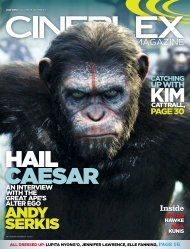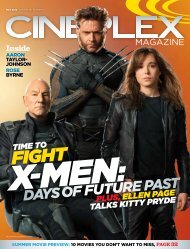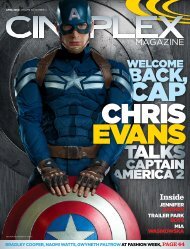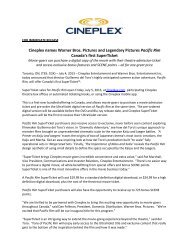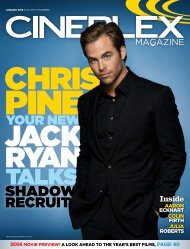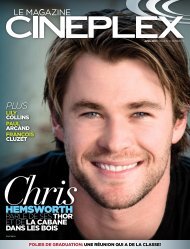HELEN
HELEN
HELEN
Create successful ePaper yourself
Turn your PDF publications into a flip-book with our unique Google optimized e-Paper software.
interview<br />
▼ ▼<br />
Leoni and Cage<br />
Director Brett Ratner (Rush Hour) was<br />
close to signing either George Clooney or<br />
Hugh Grant, but decided to make one last<br />
pitch to Cage. With filming scheduled to<br />
commence in a matter of weeks, Ratner<br />
drove out at 1 a.m. to the set of Gone in 60<br />
Seconds and, Cage recalls, said, “People love<br />
you in romantic roles...you can always make<br />
a Con Air. Why are you shying away from a<br />
Moonstruck?” It worked. Within two weeks,<br />
a $20-million deal was struck with Cage.<br />
“I guess I realized that I needed to get<br />
back to some lighter moods,” offers Cage,<br />
who says he’s also done with his “dark<br />
period” of films like Bringing Out the<br />
Dead, 8mm and Snake Eyes.<br />
But no matter what genre Cage decides<br />
to indulge — sometimes for longer periods<br />
than others care to indulge with him — he<br />
always brings his unique comic sensibility<br />
to every role. “The humour has to be<br />
organic, it has to come out of the situation,”<br />
he says. “Like life, there are some horrible<br />
situations that are funny in spite of themselves.<br />
I think it’s more interesting to attack<br />
a dire mood with humour, because humour<br />
is a survival mechanism. When I’m dealing<br />
with a lot of pain in my life, I find that I’m<br />
more funny than I am when everything is<br />
at peace. I don’t know why.<br />
“I think perhaps when I was a child that<br />
was my way of escape, or my way of dealing<br />
with the world when I was unhappy,” he<br />
adds.“If you look at most comedians, a lot of<br />
them say that they had unhappy childhoods.”<br />
By all accounts, Cage’s childhood was no<br />
exception. Raised in Long<br />
Beach, California, with two<br />
older brothers, young Nicolas<br />
was six when he began to<br />
see his mother sink into a<br />
series of severe depressions<br />
and an instability that forced<br />
her to be institutionalized for<br />
many years. His parents eventually<br />
divorced when he was<br />
12. His father, August, who<br />
was a professor of literature<br />
at Cal State Long Beach, is<br />
the brother of Francis Ford<br />
Coppola and actress Talia<br />
Shire. When August traveled<br />
on extended academic trips,<br />
young Nicolas Coppola often<br />
went to San Francisco to live with his<br />
wealthy Uncle Francis’ family for months at<br />
a time. There were many times, he recalls,<br />
that he “really enjoyed going up there,” but<br />
he didn’t exactly fit in with his more privileged<br />
cousins — or with the wealthy<br />
students at Beverly Hills High. He took a<br />
“I’ve just never been interested in playing pretty,<br />
glamorous people. Perfection, to me, is boring,” says Cage<br />
general equivalency diploma exam and left<br />
school before graduation.<br />
After frustrating rounds of auditions during<br />
which casting agents “would spend<br />
the whole audition time asking me about<br />
my Uncle Francis,” young Coppola grew<br />
tired of being “prejudged” and decided to<br />
come up with a new last name — which<br />
he took from the comic book character<br />
Luke Cage. Cage says he took a lot of heat<br />
from his Coppola relatives for his decision.<br />
“My great-great-grandfather came to<br />
America from Italy. We were paupers,<br />
struggling, and then my grandfather<br />
Carmine developed a talent, which was to<br />
play the flute,” says Cage. “Carmine married<br />
my grandmother, who was a songwriter’s<br />
daughter, and that began this sort of illustrious<br />
life in the arts. With that is a certain<br />
kind of competition and pride and a thick<br />
kind of passion that I guess by changing<br />
my name I ended.” But Cage has given his<br />
son (with former girlfriend Kristina<br />
Fulton) the name Weston Coppola Cage,<br />
“so when he gets older, he can choose<br />
whichever name he wants,” he says with a<br />
smile. “I wanted to give him everything,<br />
and let him decide for himself.”<br />
In 1982, Cage’s name change almost<br />
famous 20 december 2000<br />
immediately jump-started his career. On his<br />
first audition as Nicolas Cage, he was hired<br />
for what would be the romantic lead in<br />
Valley Girl about a preppy girl who falls in<br />
love with a punk rocker. It would be the<br />
beginning of Cage’s unrelenting desire to<br />
continually remake his image. He tried to<br />
change his look, his walk and his voice in<br />
every movie — the latter, he admits, was out<br />
of low self-esteem. “I never felt my voice had<br />
any character to it on its own merit,” he says.<br />
“So I was always trying to experiment.”<br />
And that he did — from his raspy-voiced<br />
loser in Peggy Sue Got Married to his simpleton<br />
babynapper in 1987’s Raising<br />
Arizona to his solemn drunk in 1995’s<br />
Leaving Las Vegas. “I’ve just never been<br />
interested in playing pretty, glamorous people,”<br />
he says. “Perfection, to me, is boring. I<br />
identify with people who have scars — not<br />
only on the surface — and aren’t afraid to<br />
show them. I guess I always find it uplifting<br />
that someone rises above the scars and<br />
has dignity in a bad situation.”<br />
So what’s next for Cage? Well, after six<br />
years of rewrites and rotating directors, the<br />
long-in-limbo Superman movie has finally<br />
been declared dead. It was hard for Cage to<br />
accept that he wouldn’t be leaping any tall<br />
buildings in a single bound, after he devoted<br />
so much time and energy to getting the<br />
project off the ground, not to mention<br />
turning down numerous films in order to<br />
keep his schedule clear for Clark Kent.<br />
Instead, Cage will appear in the John Woodirected<br />
film, Windtalkers. But don’t expect<br />
a typical Woo-style action extravaganza —<br />
Cage will play a marine guarding a Navajo<br />
soldier during World War Two. After that, he<br />
will play a screenwriter in the reality-based<br />
Adaptation, written and directed by the<br />
team behind Being John Malkovich.<br />
But Cage feels that his action film<br />
sojourn, despite the naysayers, has ultimately<br />
proven the best thing for his career,<br />
in that it has afforded him the clout and<br />
bankability to produce the more esoteric,<br />
less-commercial fare to which he is naturally<br />
drawn. “I’m a bit of a hot property<br />
right now,” he says, “but I also know that<br />
it’s not going to last. It never does. So I’m<br />
going to capitalize on that popularity and<br />
use it to its full advantage. This way, it will<br />
give me the time and the opportunity in<br />
the future to get back to doing small, lowbudget<br />
independent films...that’s where my<br />
heart ultimately lies.” F<br />
David Giammarco is an entertainment<br />
journalist based out of Toronto and L.A.



